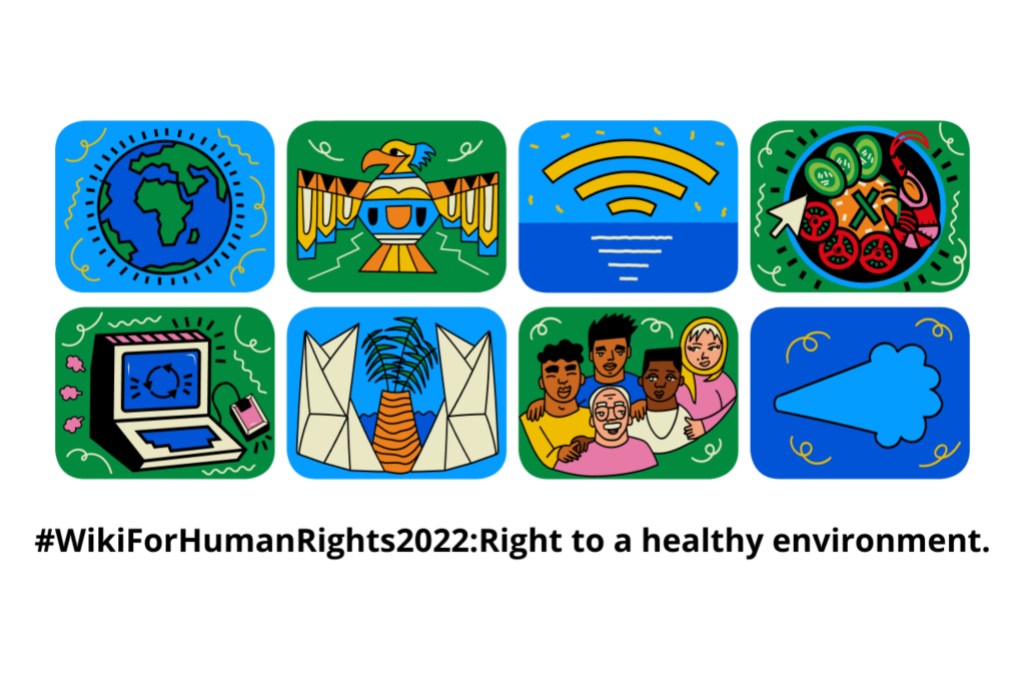
WikiForHumanRights: Right to a Healthy Environment is back! In 2021, when we focused on the intersection of climate action and human rights, communities created over 2000 articles in over 24 community events in 40 languages.
We need your help to organize the 2022 campaign April 15 to June 14, 2022, which will again focus on human rights and the environment, this time with a view toward the broader “triple planetary crisis” of climate change, pollution, and biodiversity loss. If you want to learn more, we will be hosting a community conversation hour on December 14 15:00 UTC to help you get started!
This year will be the third iteration of the international #WikiForHumanRights campaign in partnership with UN Human Rights and UN Environmental Program. We are expanding on previous iterations of the campaign based on what we learned and excited to grow the campaign with communities across the movement. Moreover, like last year, WikiForHumanRights will also once again be linked in March with the wonderful WikiGap campaign run by Wikimedia Sweden and the Swedish Foreign Ministry.
Update: To learn more about the Wikimedia Foundation’s broader commitment to Human Rights, see the recent update about our Human Rights Policy.
Why the right to a healthy environment?
As we discussed last year, the climate crises and other environmental crises are some of the most pressing of our time.
Since the 2021 campaign, the right to a healthy environment became formally recognized by the UN. According to Michelle Bachelet, UN High Commissioner for Human Rights:
A safe, clean, healthy, and sustainable environment is the foundation of human life. But today, because of human action – and inhuman inaction – the triple planetary crises of climate change, pollution, and nature loss is directly and severely impacting a broad range of rights, including the rights to adequate food, water, education, housing, health, development, and even life itself.
Michel Bachelet
However, the global community has not yet found ways to integrate human rights into all international processes for addressing environmental crises. For example, the most recent UN Climate Change Summit in Glasgow did not include significant protection of human rights.
In a world where we are constantly experiencing the negative effects of climate change, biodiversity loss and pollution, the most vulnerable frequently have basic rights violated. Humanity needs to make thousands of big and small decisions to address these problems. As the UN Environmental Program described it, we need to make “Peace with Nature” and protect the human rights of the most vulnerable.
Wikipedia and other platforms need to fill the knowledge gaps at the intersection of sustainability and human rights in every context and language. The world needs access to reliable information about the link between environmental sustainability and human rights.
We need your help to organize!
From April 15 through to June 14 2022 we encourage local affiliates, individuals or organizations interested in the campaign to organize activities around the theme of human rights and sustainability.
During the previous campaign, we saw communities focus on a wide range of topics within the themes — covering the basics of sustainable living, filling knowledge gaps about human rights and climate change, and digging deeply into topics related to activists, human rights violations and other regional environmental issues. We want to work with you to find the right activity for your community!
Everyone, everywhere, needs to know how climate change and environmental degradation are affecting their life!
Where can you start?
Join us for a conversation hour on Tuesday December 14 15:00 UTC to learn more about participating in #WikiForHumanRigths activities this upcoming year!
If you want to coordinate outreach to your region or run a local event for the Right to a Healthy Environment Campaign, or want help connecting your pre-existing activities with the campaign, join our Telegram group and let us know.
If you have questions or want help joining the campaign, please email campaigns@wikimedia.org

Can you help us translate this article?
In order for this article to reach as many people as possible we would like your help. Can you translate this article to get the message out?
Start translation